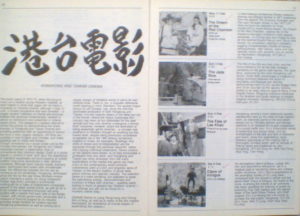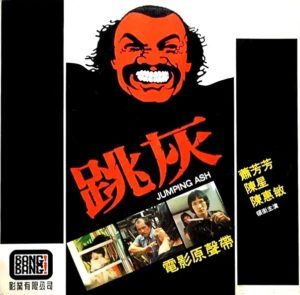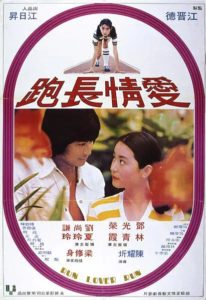Distorted Impressions
Early western perceptions of offshore Chinese cinema, an encounter in London in Sep 1979 with Taiwan actors Shi Jun, Xu Feng and Zhang Aijia [Sylvia Chang], and a season of Hong Kong/Taiwan cinema at the NFT in Feb 1980.
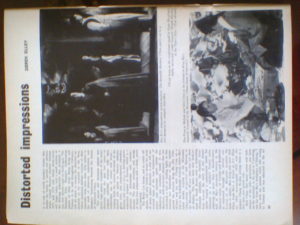 It is one of world cinema’s ironies that, despite the boom in martial arts pictures which rocked western markets between 1973 and 1975 and whose shock-waves still linger today, only a small portion of the thriving industries that produced it was ever thrown open to world gaze. The forthcoming season of 19 films from Hong Kong and Taiwan, to be held at [London’s] National Film Theatre throughout February [1980 – see programme below], will do much to correct the distorted impression so far available in the West, where mutilated dubbed versions of often execrable films have done little justice to the work of directors, cameramen and designers functioning beneath the bosom of of mainland China. The season will showcase almost two dozen high-quality examples of the major directors from the past few years – in original subtitled versions with their resplendent use of colour and scope – ranging from the various divisions of the martial arts genre to literary subjects, ghost tales, and contemporary comedies, dramas and wenyi pian 文艺片 (a thriving genre, especially popular in Taiwan, which is a mixture of melodrama and comedy/drama). The sheer invention and energy of these twin industries will, I think, prove eye-opening.
It is one of world cinema’s ironies that, despite the boom in martial arts pictures which rocked western markets between 1973 and 1975 and whose shock-waves still linger today, only a small portion of the thriving industries that produced it was ever thrown open to world gaze. The forthcoming season of 19 films from Hong Kong and Taiwan, to be held at [London’s] National Film Theatre throughout February [1980 – see programme below], will do much to correct the distorted impression so far available in the West, where mutilated dubbed versions of often execrable films have done little justice to the work of directors, cameramen and designers functioning beneath the bosom of of mainland China. The season will showcase almost two dozen high-quality examples of the major directors from the past few years – in original subtitled versions with their resplendent use of colour and scope – ranging from the various divisions of the martial arts genre to literary subjects, ghost tales, and contemporary comedies, dramas and wenyi pian 文艺片 (a thriving genre, especially popular in Taiwan, which is a mixture of melodrama and comedy/drama). The sheer invention and energy of these twin industries will, I think, prove eye-opening.
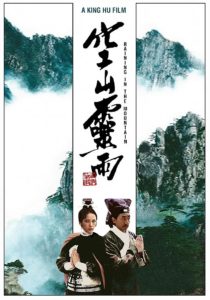 The Li Xiaolong 李小龙 [Bruce Lee] boom, and its tattier offshoots, not only failed to reveal the work of many major directors; it also left uncovered most of the vast framework of actors and actresses upon whom the industries are resolutely based. It was, therefore, with particular pleasure that one welcomed a trio of leading lights to this country last September [1979] as they accompanied the director Hu Jinquan 胡金铨 [King Hu] and his wife Zhong Ling 钟玲 on a trip to the Edinburgh Festival, where Hu’s latest works, Raining in the Mountain 空山灵雨 (1979) and Legend of the Mountain 山中传奇 (1979), were on display (see posters, left). The films were shot back-to-back in South Korea over a demanding 18-month schedule, the masterly three-hour Legend, the story of two female spirits waging a supernatural battle for inclusion in a scholar’s Tantric sutra, summing up
The Li Xiaolong 李小龙 [Bruce Lee] boom, and its tattier offshoots, not only failed to reveal the work of many major directors; it also left uncovered most of the vast framework of actors and actresses upon whom the industries are resolutely based. It was, therefore, with particular pleasure that one welcomed a trio of leading lights to this country last September [1979] as they accompanied the director Hu Jinquan 胡金铨 [King Hu] and his wife Zhong Ling 钟玲 on a trip to the Edinburgh Festival, where Hu’s latest works, Raining in the Mountain 空山灵雨 (1979) and Legend of the Mountain 山中传奇 (1979), were on display (see posters, left). The films were shot back-to-back in South Korea over a demanding 18-month schedule, the masterly three-hour Legend, the story of two female spirits waging a supernatural battle for inclusion in a scholar’s Tantric sutra, summing up 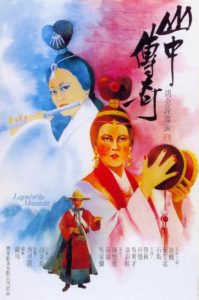 more than a decade-and-a-half of Hu’s cinematic interest in the mystical values of Daoism and Buddhism as expressed through the martial arts. Legend of the Mountain re-unites the team of actress Xu Feng 徐枫 [aka Hsu Feng] and actor Shi Jun 石隽 [aka Shih Chun] from Hu’s A Touch of Zen 侠女 (1970-73) with the popular Zhang Aijia 张艾嘉 [Sylvia Chang] joining them in a (for her) rare period role.
more than a decade-and-a-half of Hu’s cinematic interest in the mystical values of Daoism and Buddhism as expressed through the martial arts. Legend of the Mountain re-unites the team of actress Xu Feng 徐枫 [aka Hsu Feng] and actor Shi Jun 石隽 [aka Shih Chun] from Hu’s A Touch of Zen 侠女 (1970-73) with the popular Zhang Aijia 张艾嘉 [Sylvia Chang] joining them in a (for her) rare period role.
Shi, like many actors and technicians of the older generation, was born on the Mainland, in his case in Tianjin, not far from Hu’s birthplace of Beijing. “I went with my parents while still young to Taiwan and was educated in the Air Force School there, later studying Agriculture at Taiwan University. When I left university, however, I switched to chemistry, and later applied to join Union Film as a trainee actor.” A quietly spoken and very affable man in his mid-40s (see below, with Xu, shooting A Touch of Zen), Shi makes few pictures compared to many stars (a natural choosiness with scripts and an outside interest in a construction company accounting for 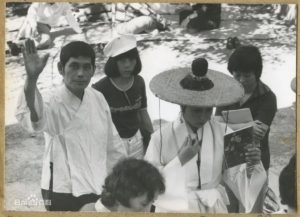 that) and confessed he did not take the métier very seriously at first, but the three years spent playing the scholar in A Touch of Zen readily equipped him for similar roles he has taken since.
that) and confessed he did not take the métier very seriously at first, but the three years spent playing the scholar in A Touch of Zen readily equipped him for similar roles he has taken since.
He was one of several people whom Hu hired and trained at Union Film in the mid-1960s; Xu (see below, with Hu, shooting A Touch of Zen), then only in her mid-teens and still at school, was another, graduating from a small role in Dragon Inn 龙门客栈 (1967) to the eponymous role of A Touch of Zen (whose Chinese title [literally] means “Brave Girl” or simply “Heroine”) since when she has carved a busy career mostly in period martial arts films (wuxia pian 武侠片). “Hu came to Taiwan to make a film and advertised for actors, so I applied. He employed a teacher to come and instruct us in the basic principles of acting. I stayed with Union for six years until my contract expired and have been freelance ever since.” In the hurly-burly of the [East Asian] freelance market, where actors often work on 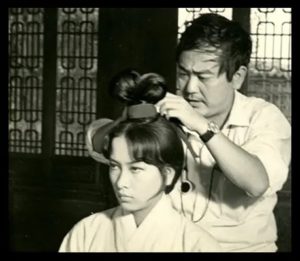 more than one picture at the same time, she admitted to the difficulty of pinpointing the more worthwhile ones at script stage. “Sometimes the script seems good, and the other actors too, but the finished product doesn’t turn out so well. I don’t like those wuxia pian which are all fighting and no content, nor those which might just as well have been set in the present for all their lack of historical pertinence.”
more than one picture at the same time, she admitted to the difficulty of pinpointing the more worthwhile ones at script stage. “Sometimes the script seems good, and the other actors too, but the finished product doesn’t turn out so well. I don’t like those wuxia pian which are all fighting and no content, nor those which might just as well have been set in the present for all their lack of historical pertinence.”
Despite her hectic schedule (she was in the middle of two films [back in Taiwan] when we spoke [in London] and had two more lined up after those), Xu was clearly enjoying her occidental holiday and proved a friendly and totally natural conversationalist, her marvellously throaty Mandarin entrancing ears accustomed to the [smoother] sounds of the professional dubbers who dominate the industry (as in Italy also). Though not yet 30 herself, she said she would only continue acting for two more years at most, voicing the fact that the Hong Kong/Taiwan industry is very much a youth-orientated one. “It’s difficult for oriental actors. Western actors mature and gain experience and can express themselves, but there are few mature roles for Chinese actors. It’s very depressing.”
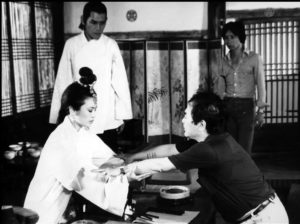 Acting as interpreter whenever my own flimsy Mandarin caved in was the third member of the trio, Zhang, a poised and self-possessed young actress with a slightly whacky sense of humour and a devastating smile to accompany her laughter (see left, shooting Legend with Shi and Hu). Mortified to discover that she spoke fluent English with an American accent, I recovered in time to learn that, though born in Taiwan, she followed her family first to Hong Kong and then to the US for three years, returning to Taiwan in 1969 where she completed her education at an American school in Taibei. After joining the TV station there to gain some practical experience for a proposed degree in Mass Communication, she wound up singing English songs on variety shows, finally being discovered by the actor Tian Feng 田丰 (and making a couple of awful films for Golden Harvest in Hong Kong) before becoming one of the freelance Mandarin industry’s liveliest talents, her perky, gamine charm blossoming in dozens of wenyi pian (her own particular favourite being Posterity and Perplexity 碧云天, 1976, directed by Li Xing 李行) and occasional Taiwan blockbusters like Victory 梅花 (1976, Liu Jiachang 刘家昌) and Eight Hundred Heroes 八百壮士 (1976, Ding Shanxi 丁善玺).
Acting as interpreter whenever my own flimsy Mandarin caved in was the third member of the trio, Zhang, a poised and self-possessed young actress with a slightly whacky sense of humour and a devastating smile to accompany her laughter (see left, shooting Legend with Shi and Hu). Mortified to discover that she spoke fluent English with an American accent, I recovered in time to learn that, though born in Taiwan, she followed her family first to Hong Kong and then to the US for three years, returning to Taiwan in 1969 where she completed her education at an American school in Taibei. After joining the TV station there to gain some practical experience for a proposed degree in Mass Communication, she wound up singing English songs on variety shows, finally being discovered by the actor Tian Feng 田丰 (and making a couple of awful films for Golden Harvest in Hong Kong) before becoming one of the freelance Mandarin industry’s liveliest talents, her perky, gamine charm blossoming in dozens of wenyi pian (her own particular favourite being Posterity and Perplexity 碧云天, 1976, directed by Li Xing 李行) and occasional Taiwan blockbusters like Victory 梅花 (1976, Liu Jiachang 刘家昌) and Eight Hundred Heroes 八百壮士 (1976, Ding Shanxi 丁善玺).
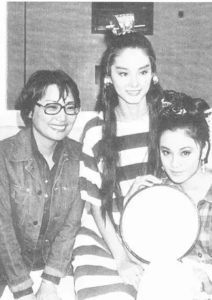 Two years ago her career took a side turn when, along with the reigning wenyi pian princess Lin Qingxia 林青霞 [Brigitte Lin], she was invited by Shaw Brothers to star in a sublime remake by director Li Hanxiang 李翰祥 of the classic Dream of the Red Chamber 金玉良缘红楼梦 (1977, see left, with Shaws executive Fang Yihua 方逸华 [Mona Fong] and Lin), and then by Hu to appear with Xu and Shi in Legend of the Mountain. She echoed everyone’s thoughts when she spoke of the special respect in which Hu is held. “We have all known him for so long, both professionally and privately. When he asks you to make a film, you just drop everything. It’s like being invited to join his family. He also makes films in a very traditional way, with a lot of discipline and rules, and spends a lot of time in preproduction to make everything perfect. Xu Feng learnt all she knows from him.”
Two years ago her career took a side turn when, along with the reigning wenyi pian princess Lin Qingxia 林青霞 [Brigitte Lin], she was invited by Shaw Brothers to star in a sublime remake by director Li Hanxiang 李翰祥 of the classic Dream of the Red Chamber 金玉良缘红楼梦 (1977, see left, with Shaws executive Fang Yihua 方逸华 [Mona Fong] and Lin), and then by Hu to appear with Xu and Shi in Legend of the Mountain. She echoed everyone’s thoughts when she spoke of the special respect in which Hu is held. “We have all known him for so long, both professionally and privately. When he asks you to make a film, you just drop everything. It’s like being invited to join his family. He also makes films in a very traditional way, with a lot of discipline and rules, and spends a lot of time in preproduction to make everything perfect. Xu Feng learnt all she knows from him.”
After a year working on the film in South Korea she returned to Hong Kong to part-finance and star in the first feature of the young, ex-TV Cantonese director Xu Anhua 许鞍华 [Ann Hui], an atmospheric chiller entitled The Secret 疯劫 (1979). Since then she has hosted an important series on the cinema for Taiwan television, as well as starring with Xu, Shi and others (including American John Phillip Law) in The Pioneers 源 (1980), directed by one of Taiwan’s brightest young directors, Chen Yaoqi 陈耀圻 [Richard Chen].* Zhang’s eventual ambitions lie more behind the camera than in front of it, though one hopes that we will not lose her too soon, even if she declares she will be choosier in future over scripts.
This year [1980] should see her headlining Hu’s next film, about a young woman journalist in modern-day Hong Kong** – a radical change of subject for Hu but close to Zhang’s own interests in contemporary HK/T youth caught in today’s East-West culture-clash (something she herself, with her itinerant education, has experienced). With Hu’s Raining and Legend going into distribution in the UK soon*** (the latter scooped virtually every major award at Taibei’s Golden Horse Awards last November [1979]), and the extensive NFT season next month [Feb 1980], actors like Zhang, Xu and Shi should become increasingly familiar names to buffs previously educated to believe that Eastern cinema begins and ends with Mifune Toshiro 三船敏郎 and Iwashita Shima 岩下志麻.
[* She does not appear in the finished film. ** The Marginal Woman was never finished. Instead she had a guest role in Hu’s next feature, The Juvenizer 终身大事 (1981), a relationships comedy that was the director’s sole non-period movie. *** This did not happen.]
(Article originally published in UK monthly films and filming, Jan 1980. Modern annotations in square brackets.)
Hong Kong and Taiwan Cinema
A season of 19 films at the National Film Theatre, London, Feb 1980.
The boom years of 1973-75, when the kung-fu craze cut a swathe across western markets, at least helped to show that Japan did not have a monopoly on Oriental cinema, although it was, in truth, a limited perspective that was revealed – a largely random collection of martial arts pictures, dubbed into atrocious Americanese, hacked to pieces to distributors and presented in rottenly duped prints. This season is a belated attempt to correct the picture by demonstrating the sheer diversity of Hong Kong and Taiwan cinema and providing audiences with an opportunity to savour the films in their original versions. (All films are subtitled in both English and Chinese, and make dazzling use of colour and scope.)
Though considered as a broad single unit by the Chinese themselves, the Hong Kong and Taiwan industries maintain a relationship more of convenience than common design. Each is in some respect a cinema in exile, built upon the experience of Mainland expatriates and promulgating an artistic tradition long since abandoned in their spiritual homeland. Although each industry trades directors, stars, technicians and writers with considerable ease, the differences between the two are as numerous as the similarities. Hong Kong, dominated since the 1960s by the vast Shaw Brothers empire (which maintains a studio run along Hollywood Golden Age lines), provides a commercial melting-pot for a mass of independent companies geared to the latest market trends, as well as for a small number of Mainland-financed left-wing studios with a stylistic foot each side of the border. Taiwan, with stricter government censorship and a measure of financial support for its industry, provides ample facilities for location-starved Hong Kong productions as well as turning out a steady stream of hortative works to serve its own political ends. There is, too, a linguistic difference worth bearing in mind. Mandarin, the spoken lingua franca for all Chinese, has, since the mid-1960s, dominated production in both Hong Kong and Taiwan. It is the majority dialect in the latter but not in the former, where the native Cantonese film industry has been all but obliterated for the past decade and has only recently undergone a revival. Both industries, however, share the distinction of being essentially genre cinemas – a concept now anathema to western thought on anything but the lowest level, despite being previously considered acceptable (as in the 18th century symphonic tradition in music, for example). Shadings, fine shifts of stress and re-interpretation are the signposts through this particular labyrinth, rather than blazing individual statements. Genre cinema, as the Italian have shown, is no less honourable a profession than any other, and Hong Kong and Taiwan are richly endowed: from the many subdivisions of the martial arts genre (wuxia pian 武侠片) to the contemporary socio-romantic melodramas (wenyi pian 文艺片) and jingoistic epics of Taiwan, to the literary tradition of ghost tales, period dramas and operatic classics. The selection below is a mere sampling, but sufficient to show the astonishing energy, resourcefulness and invention of these twin cinemas – qualities sadly lacking in much of present-day western cinema. I can promise you will not be bored for a moment. – Derek Elley
(Grateful thanks to Leung Noong-kong 梁浓刚 and Barry Chung 钟敏强, as well as to many of the film-makers themselves, for assistance at crucial stages of assembling this season.)
PROGRAMME
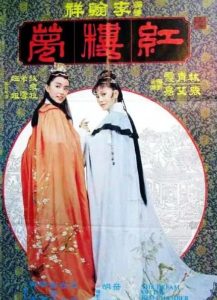 The Dream of the Red Chamber 金玉良缘红楼梦
The Dream of the Red Chamber 金玉良缘红楼梦
Mon 11 Feb 8.45 NFT1
The sumptuous Shaws costume dramas of director Li Hanxiang 李翰祥 are already familiar to NFT audiences from his diptych The Empress Dowager 倾国倾城 and The Last Tempest 瀛台泣血 shown in the 1977 London Film Festival. Here he turns his attention to the much-filmed classic by Cao Xueqin 曹雪芹, The Dream of the Red Chamber 红楼梦, casting two of the freelance Mandarin industry’s most popular actresses, Lin Qingxia 林青霞 [Brigitte Lin] and Zhang Aijia 张艾嘉 [Sylvia Chang], as the doomed lovers Baoyu and Daiyu (the former, by convention, played in travesto), juggling complementary moods of humour, sensuousness, utter beauty, satire and high operatic drama with dexterity and an almost icy fascination. Hong Kong 1977/Dir Li Hanxiang.
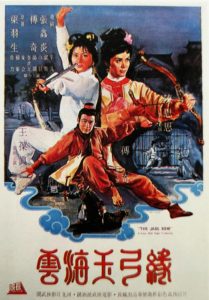 The Jade Bow 云海玉弓缘
The Jade Bow 云海玉弓缘
Sun 3 Feb 6.30 NFT1
The first of the 1960s wuxia pian, and the locus classicus for all the later fantastic variations on the genre (see films below), The Jade Bow, produced by the main Hong Kong Left studio, Great Wall, encourages a measure of social comment between the bouts of swordplay and features two winning performances from [co-director] Fu Qi 傅奇 as the beggar-hero and Chen Sisi 陈思思 as the spunky heroine, locked in an edgy alliance against Meng of the Deadly Palms. Intriguing Mainland influences in the direction and large helpings of suitably magical moments. Hong Kong 1966/Dir Zhang Xinyan 张鑫炎, Fu Qi.
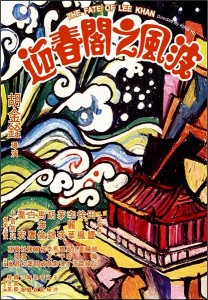 The Fate of Lee Khan 迎春阁之风波
The Fate of Lee Khan 迎春阁之风波
Sun 3 Feb 8.45 NFT1
Hong Kong cinema’s most celebrated apostle, represented here by his most formally perfect work, The Fate of Lee Khan, an elaborate game of life-and-death played out by Chinese patriots and Mongol warlords in an isolated inn to gain possession of a crucial battle plan. Hu’s impeccable sense of costuming and period detail, and his orchestration of the ebb and flow of character and event, show him assimilating many western techniques of film-making into a thoroughly Chinese ambit, with its echoes of Beijing Opera and traditional wushu 武术. Hong Kong 1973/ Dir Hu Jinquan 胡金铨 [King Hu]. With Xu Feng 徐枫, Mao Ying 茅瑛 [Angela Mao], Tian Feng 田丰.
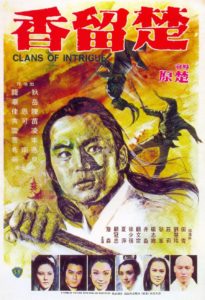 Clans of Intrigue 楚留香
Clans of Intrigue 楚留香
Sat 9 Feb 4.15 NFT1
An atmospheric blend of Mario Bava, Sergio Leone, film noir and labyrinthine whodunit, set in a magical past of wandering killers and ruthless power structures, the adaptations by Hong Kong director Chu Yuan楚原 of the swordplay novels of Taiwan author Gu Long 古龙 have revitalised both the director’s career and the genre itself. Clans of Intrigue, the fourth in the cycle, is among the richest of all: someone has been upsetting the balance of power by poisoning rival clan leaders with the sacred water of the Spirit Water Palace, and chief suspect Chu Liuxiang has one month to unmask the real culprit. Hong Kong 1977/Dir Chu Yuan. With Di Long 狄龙, Yue Hua 岳华, Miao Kexiu 苗可秀 [Nora Miao].
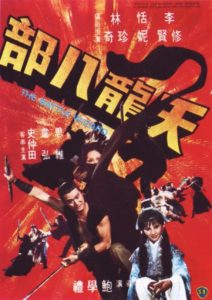 The Battle Wizard 天龙八部
The Battle Wizard 天龙八部
Sat 9 Feb 6.30 NFT1
Director Bao Xueli 鲍学礼 nudges the wuxia pian one stage further into the realms of pure ciné-fantastique, wth a whole battery of dazzling special effects, ray weaponry and assorted serpents and dragons. To free the Snake Princess, Duan Yu needs the help of the masked swordswoman Mu Wanqing, whom he rescues by sucking the blood of the Red Python; Mu, however, has vowed vengeance on the woman who wronged her mother, who was the mistress of Duan’s father. Now read on… Hong Kong 1977/Dir Bao Xueli. With Li Xiuxian 李修贤, Tian Ni 恬妮.
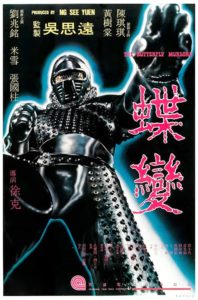 The Butterfly Murders 蝶变
The Butterfly Murders 蝶变
Sat 9 Feb 8.45 NFT1
An ambitious first feature by young, American-trained Xu Ke 徐克 [Tsui Hark] which shows Cantonese cinema embracing the fantastique genre and adding a few wrinkles of its own. Swarms of vampiric butterflies have taken over Shun Castle, and one by one the assembled guests and Tian Clan warriors fall victim to them and a mysterious robot warrior. The primaeval opening and figure of the itinerant chronicler are impressive innovations to frame the central mystery. Hong Kong 1979/Dir Xu Ke. With Liu Zhaoming 刘兆铭, Mi Xue 米雪.
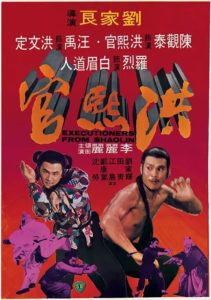 Executioners from Shaolin 洪熙官
Executioners from Shaolin 洪熙官
Tue 12 Feb 6.30 NFT1
A separate enrichment of the traditional Mandarin martial arts genre was initiated in the mid-1970s by Liu Jialiang 刘家良, the fight choreographer of director Zhang Che 张彻, who turned director with a series of Shaws films which gently questioned the rigid moral codes of Zhang’s heroes and laced the characterisations with an appealing touch of whimsy. Executioners traces the successive attempts of first father, then son, to defeat the evil priest Bai Mei with his (almost) unbeatable groin-locking technique. Easier said than done. Hong Kong 1977/Dir Liu Jialiang. With Chen Guantai 陈观泰, Luo Lie 罗烈, Li Lili 李丽丽.
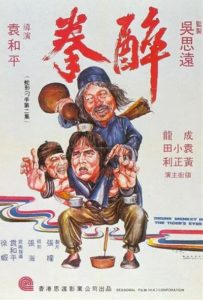 Drunk Monkey in the Tiger’s Eyes 醉拳
Drunk Monkey in the Tiger’s Eyes 醉拳
Tue 12 Feb 8.45 NFT1
Snake in the Eagle’s Shadow 蛇形刁手 [1978], by director Yuan Heping 袁和平, went one stage further by transferring the whole carpe diem philosophy of Cantonese comedy to the martial arts genre while adhering in broad balance to its structured codes. Its follow-up, Drunk Monkey, used the same formula of elderly drunken master (superbly played by the director’s father, Yuan Xiaotian 袁小田) and recalcitrant, talented pupil (Cheng Long 成龙 [Jackie Chan], currently challenging the posthumous popularity of Li Xiaolong 李小龙 [Bruce Lee]) to brilliantly witty effect. Cheng’s adroit, likeable rogue dominates the film. Hong Kong 1978/Dir Yuan Heping.
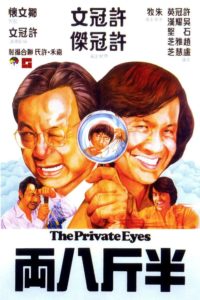 The Private Eyes 半斤八两
The Private Eyes 半斤八两
Mon 18 Feb 6.30 NFT1
The martial arts pictures of Yuan Heping were the inevitable outcome of the whole Cantonese revival encouraged by the box-office success of the comedies of ex-actor Xu Guanwen 许冠文 [Michael Hui]. The Private Eyes, written, directed by and starring Xu (with his two brothers), is essentially a string of comic vignettes strung around the story of a firm of incompetent private detectives, but Xu’s sense of timing, his Tashlinesque verve and warm characterisations impart a unity to the whole, a celebration as much as a critique of rapacious Hong Kong society. Hong Kong 1976/Dir Xu Guanwen.
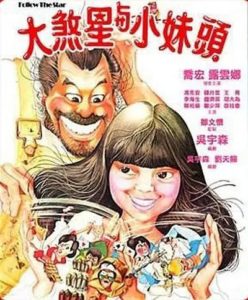 Follow the Star 大煞星与小妹头
Follow the Star 大煞星与小妹头
Mon 18 Feb 8.45 NFT1
The follow-up by Wu Yusen 吴宇森 [John Woo] to his successful The Pilferers’ Progress 发钱寒 [1977, aka Money Crazy] inhabits the same voracious world as the comedies of Xu Guanwen 许冠文 [Michael Hui] but jettisons the latter’s social concerns in favour of no-holds-barred slapstick comedy, plundering every known genre from East to West and back again to fuel the plot’s furious pace. Wu’s film decisively lays to rest the myth of Cantonese comedy’s localised humour: the stunts are terrific, the gags worthy of Keaton, and the teaming of Qiao Hung 乔宏 [Roy Chiao] and [Hong Kong-born Filipina singer] Rowena Cortes as the resourceful targets of five joke hoods is classic casting. Hong Kong 1978/Dir Wu Yusen.
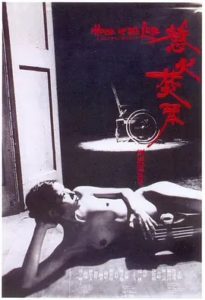 House of the Lute 欲火•焚琴
House of the Lute 欲火•焚琴
Sat 2 Feb 6.15 + 8.30 NFT2
The revival of Cantonese as a marketable film dialect in Hong Kong has coincided with a New Wave of thoughtful young ex-TV directors who are starting to make an impression on the commercial scene. The independently-financed House of the Lute, by [Macau-born] Liu Chenghan 刘成汉, is a fine curtain-raiser to our season: a stylish mixture of horror, sex and mystery film about a ménage-à-trois of rich master, beautiful young wife and servant in a big old house in the New Territories. Hong Kong 1979/Dir Liu Chenghan. With Ren Dahua 任达华 [Simon Yam].
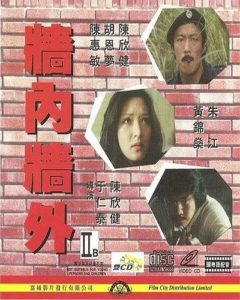 The Servants 墙内墙外
The Servants 墙内墙外
Thu 14 Feb 8.45 NFT1
A slickly-paced Cantonese police drama which draws a realistic portrait of the working lives of two Hong Kong detectives (one compromised by a powerful syndicate boss, the other marked for extermination) within a tense story of a planned diamond robbery. Laconically scripted and often very violent, the film clearly draws on the experiences of one of the directors (Chen Xinjian 陈欣健 [Philip Chan], an ex-policeman) for its convincing central portraits, while remaining a first-class thriller in its own right. Hong Kong 1979/Dir Yu Rentai 于仁泰 [Ronny Yu], Chen Xinjian. With Zhu Jiang 朱江, Chen Xinjian.
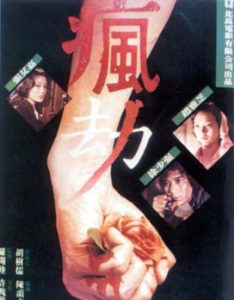 The Secret 疯劫
The Secret 疯劫
Thu 28 Feb 8.45 NFT1
The first feature of Xu Anhua 许鞍华 [Ann Hui] (starring and part-financed by the popular Taiwan actress Zhang Aijia 张艾嘉 [Sylvia Chang]) fully confirms the promise shown by her TV work as well as demonstrating the new stylistic and technical awareness of the younger generation of Cantonese directors. Based on a true murder case of 1970, The Secret begins with a chilling disclosure (the mutilated bodies of a young couple discovered tied to a tree) and constructs a nightmarish web of strange happenings en route to the final revelation of the mystery. Hong Kong 1979/Dir Xu Anhua. [Replaced by Jumping Ash 跳灰, 1976 – see below.]
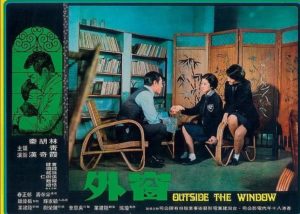 Outside the Window 窗外
Outside the Window 窗外
Wed 20 Feb 6.30 NFT1
The wenyi pian genre is basically an updated version of the classic Red Chamber tradition and can, in the right hands, become social critique as well. Outside the Window, from a novel by the prolific Taiwan writer Qiong Yao 琼瑶, compassionately traces the amour fou of an idealistic high-school girl and an older teacher, the latter finally crushed by rigid social conventions. The film has a moving simplicity typical of its director, the much-respected Song Cunshou 宋存寿. Taiwan 1973/Dir Song Cunshou, Yu Zhengchun 郁正春. With Lin Qingxia 林青霞 [Brigitte Lin].
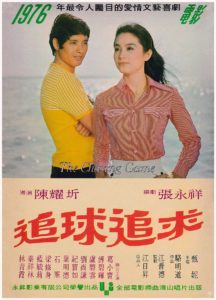 The Chasing Game 追球追求
The Chasing Game 追球追求
Wed 20 Feb 8.45 NFT1
Chen Yaoqi 陈耀圻 [Richard Chen] is one of the most talented of the younger crop of Taiwan directors to emerge in recent years, and his The Chasing Game satirises, within the conventions of the wenyi pian, the whole apparatus of upper-class Taibei sexual politics. The immaculate colour-supplement settings recall the Universal comedies of the 1960s, and the classy playing of box-office idols Lin Qingxia 林青霞 [Brigitte Lin] and Qin Xianglin 秦祥林, as pursued and pursuer, has as much style as – and considerable more energy than – Doris Day and Rock Hudson ever had. Taiwan 1976/Dir Chen Yaoqi. [Replaced by Run Lover Run 爱情长跑, 1975 – see below.]
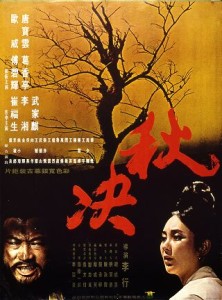 Execution in Autumn 秋决
Execution in Autumn 秋决
Fri 22 Feb 6.30 NFT1
Apart from Song Cunshou 宋存寿, Li Xing 李行 is the most respected Taiwan director of the “elder” generation, and Execution in Autumn is probably his masterpiece to date. The moving story of a man imprisoned for a crime passionnel who undergoes a profound change of outlook while biding his time before execution, the film draws its emotional power from the integration of Han dynasty philosophic thought (Daoism confronting the rigidity of Confucianism) into its story of spiritual regeneration. Exquisite visuals painting the changing seasons and a sublime score by Saito Ichiro 斋藤一郎. Taiwan 1972/Dir Li Xing. With Ou Wei 欧威, Tang Baoyun 唐宝云.
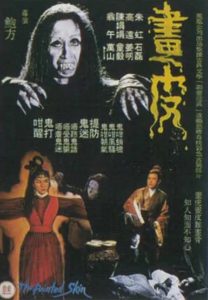 The Painted Skin 画皮
The Painted Skin 画皮
Mon 25 Feb 6.30 NFT1
“Ghost story” is too limited a term to describe one of Chinese culture’s richest genres, since it denies both the magical aspect as well as the frequent benevolence of the “haunter”. In truth, however, there is little benevolence about the beauteous spirit who hangs up her skin every night after distracting our young hero from his pre-exam swotting. The tale comes from a classic 17th century collection, here re-interpreted by the Left studio, Feng Huang, into a homily on bourgeois complacency. Hong Kong 1966/Dir Bao Fang 鲍方.
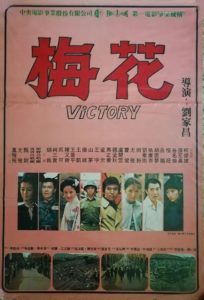 Victory 梅花
Victory 梅花
Wed 27 Feb 6.30 NFT1
Hugely successful in its native Taiwan, and directed with no holds barred by prolific journeyman Liu Jiachang 刘家昌 (since moved to Beverly Hills), Victory celebrates the achievements of Taiwan youth and the need for national solidarity in the face of foreign oppression – here, as often, by occupying Japanese. The action is mostly concentrated around an important power-plant in southern Taiwan, with the emotional upheavals of a war-stricken family providing counterpoint. Stunning photography, and an especially strong performance by young actress Zhang Aijia 张艾嘉 [Sylvia Chang]. Taiwan 1976/Dir Liu Jiachang. With Ke Junxiong 柯俊雄.
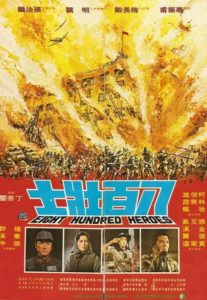 Eight Hundred Heroes 八百壮士
Eight Hundred Heroes 八百壮士
Wed 27 Feb 8.45 NFT1
Like Victory a big-budget, handsomely mounted war drama, but on this occasion based on a true incident in late-1930s Shanghai, when a group of Chinese resistance fighters held out against Japanese attack in an abandoned warehouse just across the river from the British and American concession areas. Primarily an exciting war film, and secondarily a study of heroism viewed through the filter of the Chinese family structure, Eight Hundred Heroes is a virtual catalogue of the main stars of the Mandarin industry. Taiwan 1976/Dir Ding Shanxi 丁善玺. With Ke Junxiong 柯俊雄, Lin Qingxia 林青霞 [Brigitte Lin].
(Originally published in monthly programme booklet of National Film Theatre, London, Feb 1980. Modern annotations in square brackets.)
***
[Because of last-minute print problems, The Secret was replaced by drug-trafficking thriller Jumping Ash 跳灰 (1976), by UK-born Liang Puzhi 梁普智 and veteran Hong Kong actress Xiao Fangfang 萧芳芳, both making their directing debuts; and The Chasing Game was replaced by the very similar Run Lover Run 爱情长跑 (1975), also directed by Chen Yaoqi.]
